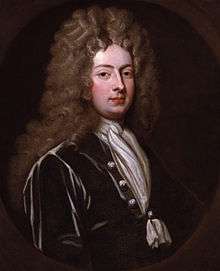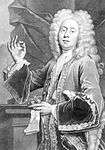The Old Bachelor
The Old Bachelor is the first play written by British playwright William Congreve, produced in 1693. Henry Purcell set it to music.
Characters and plot
The 'Old Bachelor' is Heartwell, 'a surly old bachelor, pretending to slight women', who falls in love with Silvia, not knowing her to be the forsaken mistress of Vainlove, and is lured into marrying her, only discovering her true character afterwards, from the gibes of his acquaintances. The parson who has been brought in to marry them, however, is in fact Vainlove's friend Belmour, who has assumed the disguise for the purpose of an intrigue with Laetitia, the young wife of an uxorious old banker, Fondlewife; and Heartwell is relieved to discover that the marriage was a pretence.[1]
The comedy includes the amusing characters of Sir Joseph Wittol, a foolish knight, who allows himself to be really married to Silvia, under the impression that she is the wealthy Araminta; and his companion, the cowardly bully, Captain Bluffe, who under the same delusion is married to Silvia's maid. The success of this comedy was in part due to the acting of performers Thomas Betterton and Anne Bracegirdle.[2]
See also
Notes
- A.G. Henderson, The Comedies of William Congreve, Cambridge University Press (1982), s.v. "The Old Bachelor".
- D. Mackenzie (ed.), The Works of William Congreve: Volume I, OUP Oxford (2011), v. 1.
References
- Macaulay, Thomas Babington. The Comic Dramatists of the Restoration. London, Longman, Brown, Green, and Longmans, 1853.
- Rump, E. S., (ed.) The Comedies of William Congreve, Penguin Classics (1986).
- Erskine-Hill, H., Lindsay, A. (eds), William Congreve: The Critical Heritage, Routledge (1995).
- Henderson, A. G., The Comedies of William Congreve, Cambridge University Press (1982).
- Mackenzie, D., The Works of William Congreve: Volume I, OUP Oxford (2011), v. 1.
External links
| Wikisource has original text related to this article: |
| Wikimedia Commons has media related to William Congreve. |
| Wikiquote has quotations related to: William Congreve |

